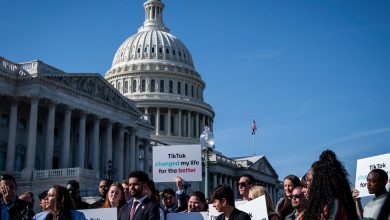In the ‘Genocide Olympics,’ Are We All Complicit?

This article is part of the Debatable newsletter. You can sign up here to receive it on Tuesdays and Thursdays.
The Olympics have been in a state of moral crisis for some time now, mired in countless controversies over bribery, corruption, financial waste, cheating, environmental damage, forced displacement of local residents and, more recently, the pandemic. But as the Times sports columnist Kurt Streeter wrote last week, “Beijing 2022 sits at a whole other level of discord.”
Casting the darkest pall over the Games by far are the human rights abuses occurring about 2,000 miles away in the region of Xinjiang, where one million or more Uighurs, a Chinese Muslim ethnic group, and other predominantly Muslim ethnic minorities are reportedly being subjected to mass detentions, forced labor, sterilization and torture. Their repression has been described by the Biden administration, among other governments, as nothing less than a genocide. (My former colleague Nick Kristof wrote in April about the appropriateness of that label.)
How, then, should we think about the weight of complicity in what some are calling the “Genocide Olympics”? What moral responsibility does China’s human rights record place on all those who participate, from corporate sponsors to athletes to casual viewers? Here’s what people are saying.
How much good does a diplomatic boycott do?
In December, the White House announced that the United States wouldn’t send an official delegation to Beijing because President Biden didn’t want to “treat these Games as business as usual.” Still, the administration said, he would “absolutely” be watching.
It’s an arguably conflicted message, one that raises questions about what other reprobative action the administration might have taken. In 1980, when the Olympics were held in Moscow, the Carter administration instituted a full boycott in protest of the Soviet invasion of Afghanistan, barring not just officials but also athletes from attending.
In retrospect, though, that boycott is largely seen as a failure. Hundreds of American athletes were deprived of a once-in-a-lifetime opportunity to compete, but the sacrifice had no discernible effect on the Soviet regime, which remained in Afghanistan until the end of the decade.
Taking note of that ill-fated decision, which prompted an apology from the U.S. Olympic and Paralympic Committee in 2020, the sports journalist Bob Costas said recently, “Unsatisfying as it may be, the course of action now that the Biden administration is taking is the correct one.”
But others think the U.S. government and others could be doing more. Victor Cha, senior vice president and Korea chair at the Center for Strategic and International Studies, agrees that a boycott that extends to competitors “makes no sense.” At the same time, he believes the diplomatic boycott depoliticizes the Games by preventing government officials from airing their criticisms within China.
“China’s playbook is to weather the political storm in the run-up to the Games with the expectation that once the competitions start, the stories of athletic gold medal performance will dominate the media cycle and will mute the political protests,” he says.
Muslim-majority countries also have a special responsibility to speak out, Yasmeen Serhan argues in The Atlantic. As diverse as they are, she notes that majority-Muslim countries do occasionally make joint condemnations of injustices perpetrated against Muslims, such as Israel’s treatment of Palestinians and the Rohingya crisis in Myanmar. But on the situation in Xinjiang, she believes the response has been lacking.
“There is no clear incentive for these countries to take a stand, nor is there an international movement advocating for majority-Muslim countries to use their collective voice,” she writes. “But without them, any Western-led effort to apply pressure on China is unlikely to have the desired effect.”
All eyes on the I.O.C.
Besides the Chinese government itself, perhaps no other entity has received as much blame for the compromised moral status of these Olympics than the International Olympic Committee.
-
In recent years, the I.O.C. has come under fire for awarding the Games to authoritarian countries, like Russia and China, precisely because they can suppress domestic opposition.
-
Making matters worse, critics note that the I.O.C. has allowed China to avoid a contractually mandated assessment of its human rights environment that future hosts will have to undergo.
-
I.O.C. rules also prohibit athletes from using the podium or the playing field to peacefully protest.
“The International Olympic Committee appears to share the Chinese party-state’s desire for a controlled event free of televised controversy,” writes Maura Elizabeth Cunningham, a historian of China, in The Times. “I.O.C. officials have rebuffed attempts to discuss the moral or political implications of holding the Games in an authoritarian state, asserting time and again that sports and politics should not mix.”
How can the I.O.C. be reformed? One idea comes fromU.S. Representatives Mike Waltz, Republican of Florida, and Jennifer Wexton, Democrat of Virginia, who have recently proposed bipartisan legislation that would strip the I.O.C. of its tax-exempt status. “American taxpayers should no longer subsidize investment into these Games that boost propaganda efforts of authoritarian regimes and embolden their image around the world,” they write in Newsweek.
What about the athletes?
No one is more vital to the Olympics than the athletes themselves. Do they bear a moral responsibility to refuse to participate? “You are the meat in the grinder of a giant entertainment-industrial complex,” Brian Alexander writes in The Boston Globe. “So if you were to begin feeling a little uncomfortable skiing, skating, or curling on the backs of innocent people imprisoned for the crime of being who they are and you decided not to go, you could force the I.O.C. to stop abetting the trampling of human rights.”
But most seem to think that an athletic boycott would be ineffective and unfair. “It hasn’t worked historically, and I don’t imagine China is super susceptible to this kind of pressure,” David Lunt, a sports historian at Southern Utah University, told The Salt Lake Tribune. “I think the consensus is it mostly hurts the athletes who trained so hard, especially since it’s once every four years. Most people’s peaks are only so long.”
What’s more, Derek Robertson reports for Politico that the World Uyghur Congress — the international organization representing the Muslim ethnic group — hasn’t campaigned for an athletic boycott, preferring that competitors use the Games as a platform to raise awareness in the style of American athletes’ Black Lives Matter advocacy.
But such advocacy could prove difficult. Aside from the pressure the I.O.C. and its sponsors are applying to athletes to avoid controversy, a representative of China’s Olympic organizing committee has warned that athletes who protest will face “certain punishment.” The disappearance last fall of Peng Shuai, a professional Chinese tennis player and former Olympian, after she accused a top political official of coercing her into a sexual relationship, also looms large. (Peng has recently re-emerged.)
“There’s a lot of us athletes who are super upset about the genocide in China,” an Olympic snowboarder, who chose to remain anonymous for fear of retaliation, told Yahoo News. “But we’re struggling to figure out, what can we do?” she said, adding, “The I.O.C. is the group that picks the host country.”
Following the money
Collectively, the top 13 corporate Olympic sponsors have contracts with the I.O.C. that add up to more than $1 billion. Activists have pressured these companies to withdraw their support, but so far, none have done so, and only four — Omega, Intel, Airbnb and Procter & Gamble — have responded to requests from The Times for comment.
“These companies stood publicly for justice after George Floyd’s murder and months of self-examination over race in America,” The Times’s Streeter writes. “But with rare exception, when pressed by lawmakers on an issue far from American shores in a country possessing a tantalizing bonanza of customers, their bold stances for justice wilted with the wind.”
Broadcasting companies also have responsibility — and leverage. Broadcasting fees account for 73 percent of the revenue that the International Olympic Committee receives; NBC alone has paid $7.75 billion for the rights to broadcast the Olympics through 2032.
“An economic and diplomatic boycott should include collaboration with NBC, which has already done important work to reveal the reality of the Chinese Communist Party’s repression and brutality,” Senator Mitt Romney, Republican of Utah, writes in The Times. “NBC can refrain from showing any jingoistic elements of the opening and closing ceremonies and instead broadcast documented reports of China’s abuses.”
To watch or not to watch?
In the absence of more robust action from the Olympics’ primary stakeholders, many viewers have been left feeling conflicted about the question of their own complicity. “If we refuse to watch, are we punishing American athletes who are blameless?” Jim Geraghty of National Review asks. “If we do watch, are we unintentionally consenting to genocide?”
Geraghty, for his part, still plans to watch, but no more than he feels is necessary: “Send just enough of a signal to NBC and the advertisers that we’re just not as interested in the Olympics when they’re hosted by nightmare regimes — and that if the I.O.C. wants the big audiences to return, then in the future, it must select noncontroversial host cities in free nations.”
As Robertson notes, though, having to perform this kind of moral calculus does not an ideal Olympic viewing experience make. “The event feels undeniably blah, utterly lacking the warm, fuzzy, global goodwill that is, yes, a shared fiction, but also the Olympics’ actual stated reason for existing,” he writes. “Welcome to the Malaise Olympics — try, if you can, not to have too much fun.”
Do you have a point of view we missed? Email us at [email protected]. Please note your name, age and location in your response, which may be included in the next newsletter.
READ MORE
“In Beijing, the Subject on Everybody’s Mind but Not Lips” [The New York Times]
“Dear Olympians: Can anyone help me reach my family?” [The Washington Post]
“How the U.S. Boycott of the Beijing Olympics Is Splitting the World” [Time]
“It’s Time to Rethink the Olympics” [The New York Times]
“Inside Beijing’s Olympic Bubble: Robots, Swabs and a Big Gamble” [The New York Times]



